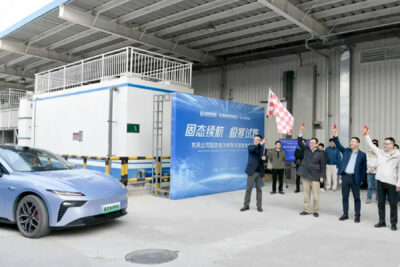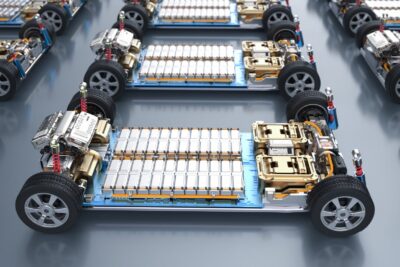SK On publishes advances in solid state battery technology
SK On is currently developing two types of solid-state batteries: a variant with polymer-oxide composites and a sulphide-based variant. The South Korean battery maker expects to have commercial prototypes ready by 2028 and 2030 respectively.
A study with Hanyang University highlights a method enhancing the long cycle life of batteries using lithium metal anodes, while another with Yonsei University uncovers the link between gel polymer electrolyte curing time and battery life.
“These achievements are the result of SK On’s continuous research and development efforts and technological expertise made possible through collaboration with academia,” says Kisoo Park, Head of SK On’s Research and Development Department. “They will serve as an important foundation for overcoming the technological challenges of solid-state batteries.”
The new research results from SK On and Hanyang University on sulphide-based lithium metal batteries were recently published in the specialist journal ACS Energy Letters. To extend the service life of such batteries, the researchers used a protective layer on the surface of the lithium metal anode at the core. The team has already applied for a patent for the method.
Currently, lithium metal is considered to be the next generation of anode material as it has a capacity of around ten times higher than that of graphite. However, it also has a high reactivity with air that can lead to the uneven formation of inorganic compounds on its surface. According to SK On, this layer hinders the movement of the lithium ions, which reduces the charging and discharging efficiency and, at the same time, promotes the formation of dendrites. The researchers are tackling the problem that solid-state batteries with lithium metal anodes usually only have a limited number of charge and discharge cycles, often around 100
To extend the life of these batteries, the research team removed the resistant surface layer by immersing the lithium metal anode in a specially formulated solution of nitromethane, dimethoxyethene and lithium nitrate. The researchers explained that, in this way, a protective layer with high ionic conductivity due to lithium nitrate and increased mechanical strength due to lithium oxide was formed. The experimental results are said to have shown that “the surface-modified lithium metal anode enables a stable cycle of over 300 charge and discharge cycles at room temperature, which triples the service life compared to conventional lithium metal solid-state batteries”.
In a second research project, SK On teamed up with Yonsei University to investigate the mechanism of cathode degradation in polymer solid-state batteries. The scientists were able to uncover the connection between the service life of batteries and the thermal curing time of gel polymer electrolytes (GPEs). Their study was recently published in the journal Angewandte Chemie.
According to the study, a longer thermal curing time of GPEs leads to better preservation of battery performance. Batteries that used electrolytes with 60 minutes of thermal curing showed a decrease in discharge capacity of 9.1 per cent, while batteries with only 20 minutes of thermal curing showed a decrease of 34 per cent. SK On says this indicates that a shorter thermal curing time leads to easier degradation of the cathode protection layer, which in turn reduces the capacity and ultimately shortens the battery’s service life.
In the study, the team also applied density functional theory calculations. This is a quantum mechanical modelling approach for calculating the arrangement of electrons in materials and predicting their energy states. The researchers used this method to determine the cause and mechanism of cathode performance degradation and to investigate the side reactions caused by residual monomers during the initial charging phase. According to SK On, the results of this study should help to improve the service life of polymer-oxide composite-based batteries.
SK On regularly publishes updates on its R&D progress. Last summer, for example, the company announced that it had created a solid polymer electrolyte for lithium metal batteries that can be operated at room temperature. At the beginning of 2025, the battery-making giant announced, among other things, that they had found a new production method for the solid electrolyte based on light energy technology.
The company’s solid-state battery pilot plant is currently being built at the Korean research centre in Daejeon with the help of Solid Power, and is expected to be completed in the second half of 2025.
including reporting by Sebastian Schaal
Source: Info by e-mail





0 Comments